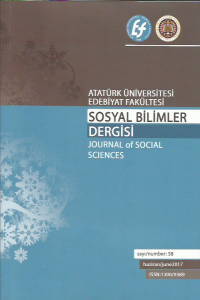TANRI’NIN FISILTISI: BİR MİSTİĞİN DİLİNDE MERHAMET / God’s Whisper: Mercy in the Language of a Mystic
Abstract
Öz
Ortaçağ sonlarına doğru Alman mistisizmine en güzel anlatımını tanrıbilimciliğin seçkin simalarından ve eşine ender rastlanan bir mistik ve panteist filozof olan Eckhart Von Hochheim vermiştir. Eckhart katı kurallar vazeden ve toleransa yer vermeyen bir inanç sistemi içinde yetişmiş olmasına rağmen, Hıristiyan dünyasında insan sevgisi çizgisinde, kendi yöntemiyle bilgeliğe ulaşan önemli bir mistiktir. O, insanın değerini çok iyi kavramış ve bu konudaki düşüncelerini mistik ve simgesel bir dille anlatmaya çalışmıştır. Bütün diğer mistikler gibi Eckhart’ta Tanrı’yı ruh’ta ve ruhu da Tanrı da yok etme düşüncesindedir. Bu bağlamda Eckhart’a göre sadece Tanrı merhametlidir ve bu yüzden kendi ilahi köklerimize dönmek için merhametle temas kurmak gerekir. Biz bu makalemizde Eckhart’ın dilinden merhamet kavramının mistik temellerini tahlil ve kritize etmeye çalışacağız.
Anahtar Kelimeler: Tanrı, İsa, İncil, Mistisizm, Meister Eckhart, Ruh, Merhamet.
Abstract
Towards the end of the Middle Ages, an unusual mystic and pantheist philosopher Eckhart Von Hochheim, who is among the eminent figures of theology, provided the most beautiful expression of German mysticism. Although Eckhart was raised in a faith system which preached strict rules and did not accommodate tolerance, he is an important mystic who attained wisdom with his own method in Christian world in line with humanity. He grasped the value of human very well and strived to explain his views on this subject with a mystical and symbolic language. As other mystics, Eckhart was of the opinion of dispelling God in spirit and spirit in God too. In this context, according to Eckhart, only God is merciful and because of this, it is necessary for us to get in touch with mercy in order to return our divine roots. In this essay, we will try to analyze and criticize the mystic grounds of the concept of mercy from Eckhard's language.
Key Words: God, Jesus, Bible, Mysticism, Meister Eckhart, Soul, Compassion.
References
- Augustinus (1999). İtiraflar, Çev: Dominiken Pamir, İstanbul: Kaknüs Yayınları.
- Blamires, David (1971). A Comparison of Their Sermons on Homo Guidam Fecit Cenam Magnam, Modern Humannities Research, Association, the Modern Language Review, Vol: 66, No: 3.
- Blondel, Maurice (2008). Mistisizm, Çev: Özkan Gözel, İstanbul: Dergâh Yayınları, 1. Baskı.
- Cevizci, Ahmet (1996). Felsefe Sözlüğü, Ankara: Ekin Yayınları, 1. Basım.
- Cook, David (2004). Filozoflar ve İnanç, Çev: Leyla Güleç, İstanbul: Haberci Basım Yayın Dağıtım.
- Çüçen, Kadir (2000). Ortaçağ Felsefe Tarihi, İstanbul: İnkılâp Kitabevi.
- Demirel, Hakkı vd (2004). Kilise Babalarından ve Yazarlarından Alıntılar, İstanbul: Ohan Matbaacılık Ltd. Şti. 2. Baskı.
- Gökberk, Macit (1990). Felsefe Tarihi, İstanbul: Remzi Kitabevi.
- Joseph, W. Koterski (2003). The Mistical Thought of Meister Eckhart: The Man From Whom God Hıd Nothı”, Theological Studies; Proguest Religion.
Abstract
References
- Augustinus (1999). İtiraflar, Çev: Dominiken Pamir, İstanbul: Kaknüs Yayınları.
- Blamires, David (1971). A Comparison of Their Sermons on Homo Guidam Fecit Cenam Magnam, Modern Humannities Research, Association, the Modern Language Review, Vol: 66, No: 3.
- Blondel, Maurice (2008). Mistisizm, Çev: Özkan Gözel, İstanbul: Dergâh Yayınları, 1. Baskı.
- Cevizci, Ahmet (1996). Felsefe Sözlüğü, Ankara: Ekin Yayınları, 1. Basım.
- Cook, David (2004). Filozoflar ve İnanç, Çev: Leyla Güleç, İstanbul: Haberci Basım Yayın Dağıtım.
- Çüçen, Kadir (2000). Ortaçağ Felsefe Tarihi, İstanbul: İnkılâp Kitabevi.
- Demirel, Hakkı vd (2004). Kilise Babalarından ve Yazarlarından Alıntılar, İstanbul: Ohan Matbaacılık Ltd. Şti. 2. Baskı.
- Gökberk, Macit (1990). Felsefe Tarihi, İstanbul: Remzi Kitabevi.
- Joseph, W. Koterski (2003). The Mistical Thought of Meister Eckhart: The Man From Whom God Hıd Nothı”, Theological Studies; Proguest Religion.
Details
| Primary Language | Turkish |
|---|---|
| Journal Section | Articles |
| Authors | |
| Publication Date | February 23, 2018 |
| Published in Issue | Year 2017 Issue: 58 |

